Introduction to Western Culture (西方文化入门)
介绍西方文化小英语作文
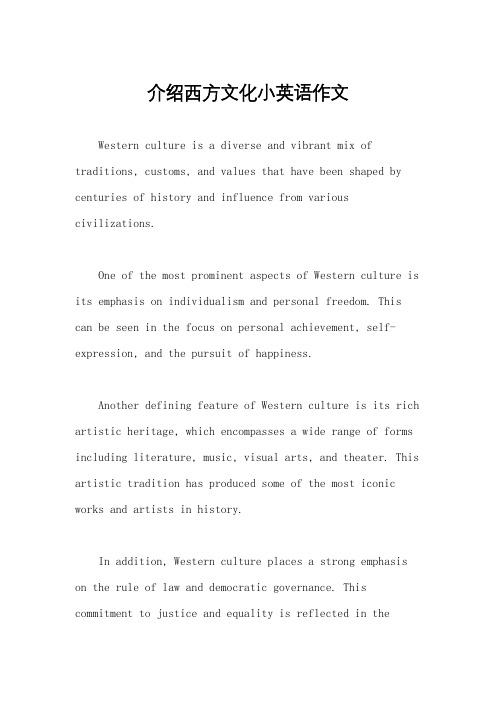
介绍西方文化小英语作文Western culture is a diverse and vibrant mix of traditions, customs, and values that have been shaped by centuries of history and influence from various civilizations.One of the most prominent aspects of Western culture is its emphasis on individualism and personal freedom. This can be seen in the focus on personal achievement, self-expression, and the pursuit of happiness.Another defining feature of Western culture is its rich artistic heritage, which encompasses a wide range of forms including literature, music, visual arts, and theater. This artistic tradition has produced some of the most iconic works and artists in history.In addition, Western culture places a strong emphasis on the rule of law and democratic governance. This commitment to justice and equality is reflected in thelegal systems and political institutions of Western societies.Furthermore, Western culture has a strong tradition of scientific inquiry and technological innovation. This hasled to major advancements in fields such as medicine, engineering, and information technology.Moreover, Western culture has a rich culinary tradition that varies widely from region to region. From Italianpasta to French pastries to American barbecue, the cuisineof the West is as diverse as its people.Finally, Western culture has a strong tradition ofsports and leisure activities, with a wide range of popular pastimes including football, basketball, skiing, and hiking.In conclusion, Western culture is a complex and multifaceted phenomenon that encompasses a wide range of traditions, values, and practices. Its rich history and diverse influences have shaped it into a dynamic and influential force in the world today.。
西方文化了解的英语作文

西方文化了解的英语作文英文回答:Western culture is a rich and diverse tapestry that encompasses a wide range of traditions, beliefs, and values. One aspect of Western culture that I find particularly fascinating is its emphasis on individualism. In Western societies, individuals are encouraged to express their unique identities and pursue their own goals and aspirations. This can be seen in various aspects of Western culture, such as the emphasis on personal achievement, the celebration of individual rights and freedoms, and the encouragement of self-expression in art, fashion, and lifestyle choices.Another interesting aspect of Western culture is its strong emphasis on democracy and the rule of law. Western societies place a high value on the principles of equality, justice, and accountability. This can be seen in the democratic systems of government that are prevalent in manyWestern countries, where citizens have the right to vote and participate in decision-making processes. The rule of law ensures that everyone is subject to the same set of laws and regulations, regardless of their social status or position of power.Furthermore, Western culture is known for itsscientific and technological advancements. Western societies have made significant contributions to fields such as medicine, engineering, and information technology. This emphasis on innovation and progress has led to numerous breakthroughs and advancements that have greatly improved the quality of life for people around the world. For example, Western countries have pioneered the development of vaccines, medical treatments, and communication technologies that have revolutionized healthcare and connectivity.In addition, Western culture places a strong emphasis on education and intellectual pursuits. Western societies value knowledge, critical thinking, and intellectual curiosity. This can be seen in the emphasis on formaleducation, the availability of libraries and educational resources, and the promotion of lifelong learning. Western countries have renowned universities and researchinstitutions that attract students and scholars from all over the world, fostering a vibrant intellectual community.中文回答:西方文化是一个丰富多样的织锦,包含了各种传统、信仰和价值观。
introduction to western culture

There was one big difference between Greeks and Romans. The Romans built up a vast empire: the Greeks didn’t, except for the brief moment of Alexander ’ s conquests, which soon disintegrated.
Christianity's Advantages
Its founder was an actual person. It had the Jewish legal code and tradition of morality.
Christianity appealed to the downtrodden masses. Women, low-skilled workers, prostitutes, the uneducated, slaves, fishermen, tax collectors, and so forth were the companions and "beloved" of Jesus, and a growing class of the oppressed and despised saw Christianity as the only faith that viewed them without contempt -- as "the salt of the Earth" -- and that offered them the hope of a better life -- sometime.
Odyssey
西方文化了解的英语作文
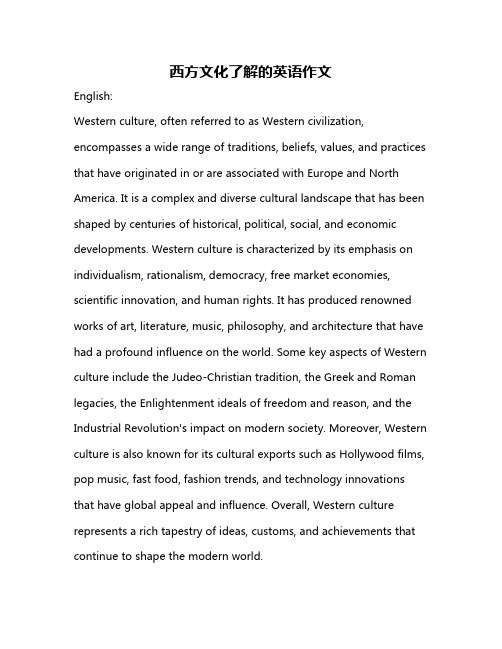
西方文化了解的英语作文English:Western culture, often referred to as Western civilization, encompasses a wide range of traditions, beliefs, values, and practices that have originated in or are associated with Europe and North America. It is a complex and diverse cultural landscape that has been shaped by centuries of historical, political, social, and economic developments. Western culture is characterized by its emphasis on individualism, rationalism, democracy, free market economies, scientific innovation, and human rights. It has produced renowned works of art, literature, music, philosophy, and architecture that have had a profound influence on the world. Some key aspects of Western culture include the Judeo-Christian tradition, the Greek and Roman legacies, the Enlightenment ideals of freedom and reason, and the Industrial Revolution's impact on modern society. Moreover, Western culture is also known for its cultural exports such as Hollywood films, pop music, fast food, fashion trends, and technology innovations that have global appeal and influence. Overall, Western culture represents a rich tapestry of ideas, customs, and achievements that continue to shape the modern world.中文翻译:西方文化,通常被称为西方文明,涵盖了起源于欧洲和北美洲或与之相关的广泛传统、信仰、价值观和实践。
西方文化介绍introduction of western culture lesson5 - The Age of Discovery大发现时代
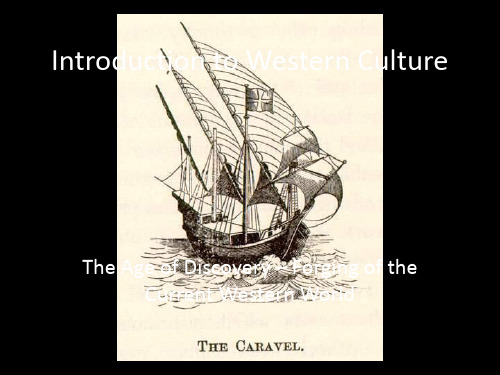
Dias: The most important voyager from Portugal.
Atlantic Ocean (1419-1507)
• Portugal – Prince Henry the Navigator
– Explored Madeira (1419) and Azores (1427) fairly early. – Exploration of Africa, for trading in Slaves and Gold. – Dias: 1487, to the Cape of Good Hope
– It lasted from 1519-1521
Cortes’ Mexico and the Aztec Empire
• Cortes went on an expedition into Mexico, to explore the country.
– It lasted from 1519-1521 – The Civilization they encountered their were the Aztecs. – The Aztecs took the Cortez and his men to their Capital City, Tenochtitlan.
Introduction to Western Culture
The Age of Discovery – Forging of the Current Western World
The Age of Discovery
• 15th-17th Century • Europeans began an intensive exploration of the world
介绍西方文化活动英语作文

介绍西方文化活动英语作文Introduction to Western Cultural Activities。
Western cultural activities are a great way to learn about and experience the diverse traditions and customs of different countries. These activities range from festivals and holidays to music, dance and theater performances, and art exhibitions.One of the most popular cultural activities in the Western world is the celebration of Christmas. This holiday is celebrated on December 25th and is a time for families to come together and exchange gifts. In addition to Christmas, there are many other holidays celebrated throughout the year, such as Easter, Halloween, and Thanksgiving.Another popular cultural activity is attending music concerts and festivals. Western music has a rich history and diverse genres, from classical to rock and roll,country, and pop. Music festivals such as Coachella, Glastonbury, and Lollapalooza attract thousands of fans from around the world.Theater and dance performances are also an important part of Western culture. Broadway shows in New York City, for example, are world-renowned for their high-quality productions. Ballet and modern dance performances are also popular, with famous companies such as the American Ballet Theatre and the Alvin Ailey American Dance Theater.Art exhibitions and museums are another way to experience Western culture. The Louvre in Paris, the Metropolitan Museum of Art in New York City, and the Tate Modern in London are just a few of the many famous museums that house some of the world's most famous works of art.In addition to these cultural activities, sports are also an important part of Western culture. Soccer, basketball, baseball, and American football are just a few of the many popular sports played and watched in the Western world.In conclusion, Western cultural activities offer a diverse range of experiences that allow people to learn about and appreciate the traditions and customs ofdifferent countries. From festivals and holidays to music, dance, and theater performances, and art exhibitions, there is something for everyone to enjoy.。
西方的文化介绍英文作文
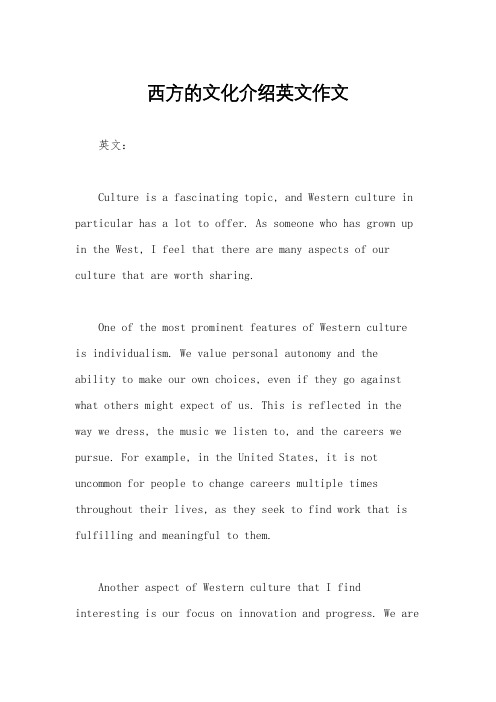
西方的文化介绍英文作文英文:Culture is a fascinating topic, and Western culture in particular has a lot to offer. As someone who has grown up in the West, I feel that there are many aspects of our culture that are worth sharing.One of the most prominent features of Western culture is individualism. We value personal autonomy and theability to make our own choices, even if they go against what others might expect of us. This is reflected in the way we dress, the music we listen to, and the careers we pursue. For example, in the United States, it is not uncommon for people to change careers multiple times throughout their lives, as they seek to find work that is fulfilling and meaningful to them.Another aspect of Western culture that I find interesting is our focus on innovation and progress. We arealways looking for new ways to improve our lives and the world around us, whether that means developing new technologies, exploring new frontiers, or pushing the boundaries of artistic expression. This drive for innovation is what has led to many of the great accomplishments of Western civilization, from the Renaissance to the Industrial Revolution to the space race.Of course, Western culture is not without its flaws. One criticism that is often leveled against us is that we can be overly materialistic and consumerist, focusing too much on accumulating wealth and possessions rather than on building meaningful relationships and pursuing spiritual growth. This is something that I think we need to be mindful of, and work to address in our own lives and in our broader society.Overall, I believe that Western culture has a lot to offer, both in terms of its strengths and its weaknesses. By learning about and engaging with different cultures, we can broaden our perspectives and become more well-rounded individuals.中文:文化是一个迷人的话题,尤其是西方文化有很多值得分享的地方。
西方文化引进中国的好处英语作文

西方文化引进中国的好处英语作文The introduction of Western culture to China has brought about numerous benefits that have significantly transformed the country's social, economic, and political landscape. As the two vastly different civilizations have interacted and exchanged ideas, China has experienced a remarkable period of growth and development, ultimately strengthening its position on the global stage.One of the most prominent benefits of Western culture's influence on China is the advancement of education. The implementation of Western educational systems and teaching methodologies has revolutionized the way Chinese students learn and acquire knowledge. The emphasis on critical thinking, problem-solving, and independent research has fostered a more dynamic and engaging learning environment, equipping students with the necessary skills to thrive in the 21st century.Furthermore, the exposure to Western literature, art, and philosophy has broadened the intellectual horizons of the Chinese people. The influx of works by renowned Western thinkers, artists, and writers hasenriched the cultural landscape, inspiring Chinese scholars and creatives to engage in cross-cultural dialogues and explore new avenues of expression. This exchange of ideas has led to the emergence of a more diverse and vibrant cultural scene, where traditional Chinese values coexist harmoniously with Western influences.The economic benefits of Western culture's integration into China are also undeniable. The adoption of Western business practices, management strategies, and technological innovations has propelled China's economic growth to unprecedented levels. The incorporation of Western financial systems, investment models, and marketing techniques has enabled Chinese companies to become more competitive in the global marketplace, attracting foreign investment and expanding their reach beyond the country's borders.Moreover, the introduction of Western consumer culture has transformed the lifestyle and purchasing habits of the Chinese population. The availability of a wider range of products, services, and entertainment options has not only diversified the consumer landscape but also encouraged the development of a thriving middle class. This shift in consumer behavior has contributed to the overall economic prosperity of the nation, as the growing demand for goods and services fuels the country's industrial and commercial sectors.In the realm of social and political reforms, the influence of Western culture has been instrumental in shaping China's transformation. The promotion of democratic principles, human rights, and the rule of law has inspired Chinese citizens to advocate for greater individual freedoms and civil liberties. While the pace of these reforms may vary, the gradual integration of Western values has undoubtedly challenged the traditional power structures and encouraged a more open and inclusive political discourse.Furthermore, the exposure to Western media, communication technologies, and social platforms has empowered the Chinese people to access a broader range of information, connect with the global community, and voice their opinions more freely. This increased access to information and the ability to engage in cross-cultural exchanges have fostered a more informed and engaged citizenry, contributing to the ongoing process of social and political evolution in China.Additionally, the influence of Western culture has had a positive impact on China's approach to environmental protection and sustainability. The adoption of Western environmental regulations, clean energy technologies, and eco-friendly practices has helped China address pressing environmental challenges, such as air pollution, water scarcity, and the preservation of natural habitats. This shift towards a more sustainable development model has notonly improved the quality of life for Chinese citizens but also positioned the country as a global leader in the fight against climate change.In the realm of healthcare, the integration of Western medical practices and technologies has revolutionized the Chinese healthcare system. The introduction of advanced diagnostic tools, surgical techniques, and pharmaceutical innovations has greatly improved the quality of medical care, leading to better health outcomes for the Chinese population. Furthermore, the collaboration between Chinese and Western healthcare professionals has facilitated the exchange of knowledge and the development of more comprehensive and effective treatment protocols.Finally, the exposure to Western cultural traditions and customs has enriched the social fabric of China, fostering a greater appreciation for diversity and cross-cultural understanding. The incorporation of Western festivals, cuisines, and recreational activities has not only broadened the cultural horizons of the Chinese people but also encouraged the preservation and celebration of their own unique heritage. This cultural exchange has strengthened the bonds between China and the global community, promoting mutual understanding and respect.In conclusion, the integration of Western culture into China hasbrought about a myriad of benefits that have transformed the country in significant ways. From advancements in education and the economy to social and political reforms, the influence of Western culture has contributed to China's remarkable progress and solidified its position as a global powerhouse. As China continues to navigate the challenges and opportunities presented by this cultural exchange, the country's future remains bright, with the potential to forge even stronger ties with the rest of the world.。
Introduction to Western Culture Review

Introduction to Western Culture ReviewWhat is Western Culture?: Western culture is a term used very broadly to refer to a heritage of social norms, ethical values, traditional customs, belief systems, political systems, and specific artifacts and technologies that have some origin or association with Europe.Western culture is the product of TWO major cultural systems:1)Graeco-Roman culture;2)and Christianity.Why should we study Western culture?Elements of Western culture have had a very influential effect on other cultures worldwide.Ancient Greek history (776BC - 600AD) can be divided into the following periods:∙The Archaic period (c. 800 – c. 500 BC).∙The Classical period (c. 500 – 323 BC).∙In the Hellenistic period (323–146 BC)Much of modern Western politics, artistic thought, such as architecture, scientific thought, literature, and philosophy derives from this period of Greek history. Greek history is dominated by Athens, the source of much of the political thought, religion, literature, art and philosophy which survives to this day.Key PointsReligion: A polytheistic (多神论) religion●Political: Divided into many self-governing city-states through Greece’s geography. Most cities originallygoverned by an oligarchy (寡头政治)but challenged by the tyrants (篡权者,僭主) and became democracies (民主)●Colonisation: Rapidly increasing population lead to the colonisation (殖民)of much of the areas around theMediterranean, spreading Greek culture●Economy & Trade: Slave economy. Traded widely throughout the Mediterranean●Athenian democracy (550BC): Rule by adult male citizens with equality under the law●Epic Poetry:A long narrative poem usually concerned with heroes or heroic deeds important to a nation.The most important poems were The Iliad <<伊利亚特>> and The Odyssey 《奥德赛》(古希腊史诗,作者为荷马)Ancient Roman culture is the refinement (改良)of the innovation of the Greeks. This is why this period of Western history is often called the Graeco-Roman or the Classical period.The Historical Development of Ancient Rome●Rome began as a small village on the Tiber around 800 BC●Early Rome gradually expanded itself to become the leading city in Italy●Early Roman history was marked by the reign of the seven Kings, all of which were elected by the peoplefor life. After the tyrannical reign of Tarquinius Superbus●Rome became a Republic in 509 BC, ruled by its citizens (like Athens)●In 27 AD, Rome became an Empire. The Roman Empire was quite different from the Chinese Empire -Emperors were more often than not chosen by the army and not the son of the previous Emperor.●The Emperor was a GodRoman Society●The basic social structure of Rome in the early period was of the farmer-soldier-citizen (the plebeians 老百姓) and a residual aristocracy (贵族)holding most of the political power.●Roman society was established as a hierarchy based on legal distinctions between the ruling class and theruled, the rich and the poor, the aristocracy and the common people, the citizen and the non-citizen, the free and the slaves●The empire was multiculturalRoman Law:Roman law was codified and formed the basis of the large majority of Europe (and then the world’s) legal system.Roman Economy:The economy was highly developed. The economy was based on inter-imperial trade. The economy was heavily monetized (used money not goods (物品)to trade)Roman Religion: Polytheistic and based mostly on Greek religionRoman Literature●Virgil (70 - 19BC): The great writer of epic poetry, his masterwork was The Aeneid●Ovid (43BC - 17AD): Ovid’s masterpiece was The Metamorphoses, a collection of 250 stories and mythsfrom the Roman Empire. These stories have provided much of the foundation for later Western literature, drama and art.Roman Architecture and Art●Heavily influenced by the Greeks●Developed the ability to construct and arch/dome●Used concrete and glassJewish Culture and the Old TestamentIntroduction:●Jewish culture is the culture of the Jewish people●Jewish culture is 3000 years old. Jewish culture began in the Middle East in the Bronze Age (青铜时代)●Jewish culture is the origin of the Abrahamic (.亚伯拉罕的) religions (Judaism犹太教Christianity 基督教Islam 伊萨兰教)●The Jewish people are an ethnoreligious (宗教民族)people●Judaism is a monotheistic (one god) religion●Currently there are estimate to be 12 million Jews, mostly living in Israel and the United States●The Old Testament (旧约全书)●The major contribution that Judaism has made to Western culture is the Tanakh, known as the OldTestament in Christianity.●The Old Testament is composed of 24 - 51 Books, depending on which version you read.●The Old Testament contains the story of how God created the world, the history of the Jewish people, thelaws of the Jewish people and the prophecies of the Messiah.Christianity and the New TestamentIntroduction●Christianity is the most important religion in Western culture.●Christianity is a monotheistic religion (one god) based on the life of Jesus Christ presented in the NewTestament●In the past, Christianity exerted a high level of influence on Western social and intellectual life, as well asthe life of the common people.●Christianity is not a unified religion - it is divided into the main sects (派别)of Catholic (天主教)EasternOrthodox (东正教)and Protestant (新教教)Christianity.●Currently, there are around 2.2 billion Christians worldwide.Fundamental Beliefs in ChristianityChristians believe in the Original Sin - that man is sinful (罪孽)。
关于西方文化的英语作文
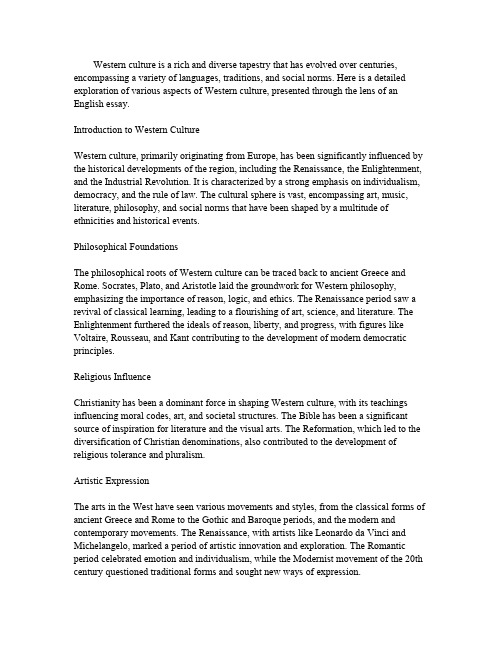
Western culture is a rich and diverse tapestry that has evolved over centuries, encompassing a variety of languages,traditions,and social norms.Here is a detailed exploration of various aspects of Western culture,presented through the lens of an English essay.Introduction to Western CultureWestern culture,primarily originating from Europe,has been significantly influenced by the historical developments of the region,including the Renaissance,the Enlightenment, and the Industrial Revolution.It is characterized by a strong emphasis on individualism, democracy,and the rule of law.The cultural sphere is vast,encompassing art,music, literature,philosophy,and social norms that have been shaped by a multitude of ethnicities and historical events.Philosophical FoundationsThe philosophical roots of Western culture can be traced back to ancient Greece and Rome.Socrates,Plato,and Aristotle laid the groundwork for Western philosophy, emphasizing the importance of reason,logic,and ethics.The Renaissance period saw a revival of classical learning,leading to a flourishing of art,science,and literature.The Enlightenment furthered the ideals of reason,liberty,and progress,with figures like Voltaire,Rousseau,and Kant contributing to the development of modern democratic principles.Religious InfluenceChristianity has been a dominant force in shaping Western culture,with its teachings influencing moral codes,art,and societal structures.The Bible has been a significant source of inspiration for literature and the visual arts.The Reformation,which led to the diversification of Christian denominations,also contributed to the development of religious tolerance and pluralism.Artistic ExpressionThe arts in the West have seen various movements and styles,from the classical forms of ancient Greece and Rome to the Gothic and Baroque periods,and the modern and contemporary movements.The Renaissance,with artists like Leonardo da Vinci and Michelangelo,marked a period of artistic innovation and exploration.The Romantic period celebrated emotion and individualism,while the Modernist movement of the20th century questioned traditional forms and sought new ways of expression.Literature and LanguageWestern literature is diverse,ranging from the epic poetry of Homer to the philosophical novels of Dostoevsky and the existential works of Camus.The development of the printing press in the15th century democratized the distribution of written works,leading to an increase in literacy and the spread of ideas.English,as one of the most widely spoken languages in the world,has been a significant carrier of Western cultural values and ideas.Musical TraditionsWestern music has a rich history,from the sacred music of the medieval period to the complex compositions of the Baroque era,the classical symphonies of Mozart and Beethoven,and the diverse genres of the20th century,including jazz,rock,and electronic music.The development of music theory and notation has allowed for the preservation and dissemination of musical works across generations.Social and Political StructuresThe social and political structures of Western culture have been marked by the evolution from feudalism to modern democracies.The Magna Carta,the American Declaration of Independence,and the French Revolution are key events that have shaped the principles of individual rights,representation,and the separation of powers.Culinary HeritageWestern cuisine is as varied as its cultures,with French,Italian,Spanish,and British cuisines being some of the most renowned.The use of dairy products,meats,and a variety of grains is common,and the emphasis on the quality of ingredients and the presentation of dishes is a hallmark of Western culinary traditions.ConclusionWestern culture is a complex and everevolving entity,shaped by a multitude of historical, philosophical,artistic,and social influences.It continues to influence and be influenced by global cultures,making it a dynamic and integral part of the worlds cultural landscape. Understanding Western culture requires an appreciation of its depth and diversity,as well as an awareness of its ongoing impact on contemporary society.。
西方文化介绍,中世纪的西方introduction of western culture lesson3 - The Medieval West
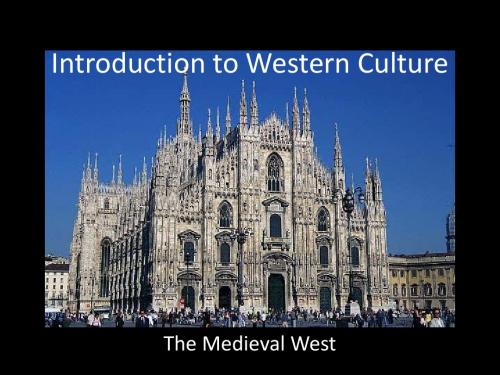
The Catholic Church
• Means ‘universal church’ • Tradition holds it was founded by Jesus Christ in the 1st Century AD.
– Bishops: successors of Christ's 12 apostles. – Pope: successor of Saint Peter.
The End of the Roman Empire
• Emperor Diocletian
– Split the Empire into East and West in 286 AD
• 378 – Battle of Adrianople
– War was changing: Horses more important. – Most of the Roman army was defeated.
Re-introduction of Classical Culture
• Over time, Greek and Roman culture was reintroduced across the borders from the Byzantine Empire. • 10th Century: Rediscovery of Justinian Code
The Catholic Church
• Means ‘universal church’ • Tradition holds it was founded by Jesus Christ in the 1st Century AD.
– Bishops: successors of Christ's 12 apostles. – Pope: successor of Saint Peter. – Immaculate Conception: The Virgin Mary
西方文化介绍introduction of western culture lesson4 Renaissance文艺复兴
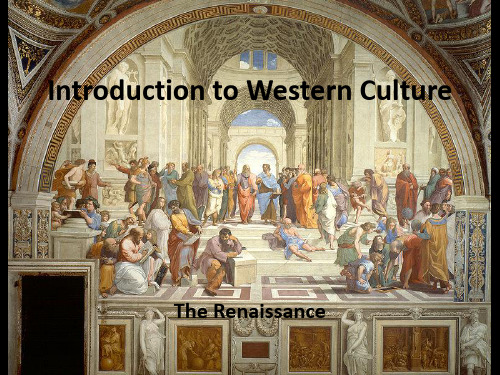
• It is thought that two factors played a big part.
1. The Medici family, a banking family, in patronizing and stimulating arts. 2. Lucky birth of several great men: Da Vinci, Botticelli and Michealangelo.
• These men were only able to rise to such prominence because of the cultural conditions in Florence though.
Humanism
• Humanism is best understood by looking at what happened before it. • Medieval education was scholastic, preparing people to be doctors, lawyers of religious experts. • Humanism aimed not to produce professionals, but a better type of person.
– The scientific method,is the basis for all modern science, and made great contributions to astronomy, physics, biology and anatomy.
• Merchants are people who make use of the commercial system for profit. • Italian society was based on commerce and merchants, which made it different from the rest of Europe.
西方文化引进中国的好处英语作文
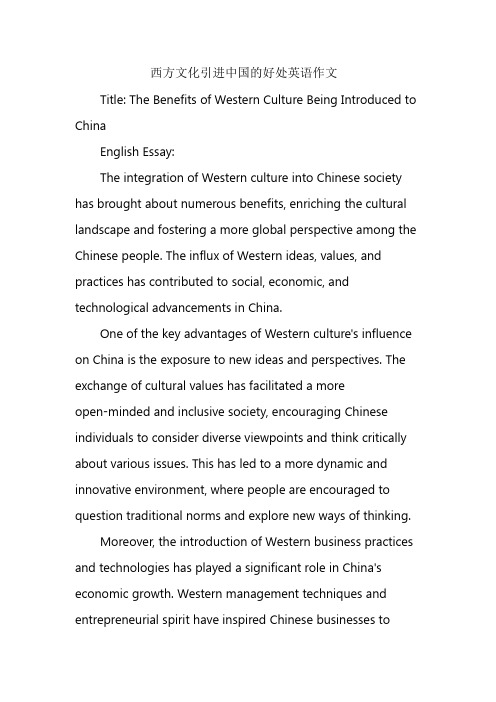
西方文化引进中国的好处英语作文Title: The Benefits of Western Culture Being Introduced to ChinaEnglish Essay:The integration of Western culture into Chinese society has brought about numerous benefits, enriching the cultural landscape and fostering a more global perspective among the Chinese people. The influx of Western ideas, values, and practices has contributed to social, economic, and technological advancements in China.One of the key advantages of Western culture's influence on China is the exposure to new ideas and perspectives. The exchange of cultural values has facilitated a moreopen-minded and inclusive society, encouraging Chinese individuals to consider diverse viewpoints and think critically about various issues. This has led to a more dynamic and innovative environment, where people are encouraged to question traditional norms and explore new ways of thinking.Moreover, the introduction of Western business practices and technologies has played a significant role in China's economic growth. Western management techniques and entrepreneurial spirit have inspired Chinese businesses toadopt more efficient and innovative strategies, resulting in increased productivity and economic prosperity. Additionally, the adoption of Western technology has accelerated China's progress in fields such as telecommunications, internet, and artificial intelligence.Western education systems, with their focus on individualism, critical thinking, and creativity, have also positively impacted Chinese society. The integration of Western educational practices has encouraged Chinese students to pursue their passions, develop their unique talents, and strive for excellence. This has not only led to a more well-rounded education but has also contributed to the cultivation of a generation of leaders and innovators.Furthermore, the exposure to Western arts, literature, and entertainment has enriched Chinese cultural life. The popularity of Western films, music, and fashion has provided Chinese citizens with a broader range of cultural experiences, enhancing their quality of life and fostering a sense of cultural diversity and tolerance.In conclusion, the introduction of Western culture to China has brought about numerous benefits, fostering social progress, economic development, and the cultivation ofinnovative thinking. The integration of Western ideas and values has contributed to a more open and inclusive society, where individuals are encouraged to explore new perspectives and push the boundaries of traditional norms. The continued exchange and融合of Western and Chinese cultures will undoubtedly continue to benefit both societies in numerous ways.中文翻译:西方文化融入中国社会带来了许多好处,丰富了文化景观,并使中国人民更加具有全球视野。
介绍西方文化 英语作文

介绍西方文化英语作文Western culture is incredibly diverse and rich, encompassing various traditions, customs, arts, and values. 西方文化非常多样丰富,包括各种传统、风俗、艺术和价值观。
From music and fashion to literature and food, Western culture has greatly influenced societies around the world. 从音乐和时尚到文学和食物,西方文化对世界各国的社会产生了深远影响。
One of the most prominent aspects of Western culture is its emphasis on freedom and individualism. 西方文化最明显的特点之一是强调自由和个人主义。
This can be seen in the democratic political systems of many Western countries, as well as in the importance placed on personal choice and autonomy in everyday life. 这可以在许多西方国家的民主政治体制中看到,也可以在日常生活中个人选择和自主决定的重要性中体现出来。
Art and literature play a significant role in Western culture, with renowned artists and writers such as Leonardo da Vinci, Shakespeare, and Van Gogh shaping the artistic landscape. 艺术和文学在西方文化中扮演着重要角色,著名艺术家和作家如达芬奇、莎士比亚和梵高塑造了艺术风景。
西方文化介绍introduction of western culture lesson7 - Start of the Modern Era现代时期
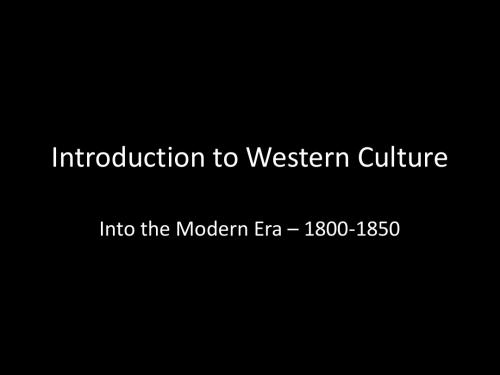
Mercantilism
• This is an early capitalist economic idea. • The Age of Discovery led to a bigger world, with more opportunities to trade.
Mercantilism
• Heliocentric model replacing Geocentric model. • 4 elements theory, that all things are made of earth, water, air and fire, replaced by atomism.
– The most important thing though was the scientific method. – This is a systematic, mathematical interpretation of experiments and empirical facts.
– Martin Luthor – John Calvin
• They objected to some things within the Catholic Church that they thought were wrong
– Indulgences – remission from punishment for sins – Simony – buying an selling of clerical office
1. Sola Scriptura: The Bible, rather than church tradition, is where Christians find their teachings. 2. Sola Fide: Salvation (heaven) comes by faith alone in Jesus.
AN INTRODUCTION TO WESTERN__ CULTURE2
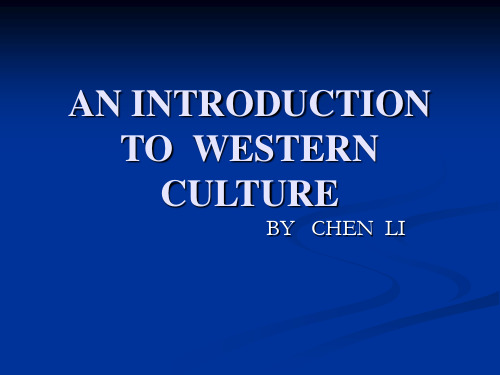
3.Movies DVD &TV Programs
You may watch TV / DVD, see films related to this course both in and out of class. They are quite helpful for your understanding of western culture.
II.THE LANDS AND SETTLEMENT OF ANCIENT GREECE
雅典
III. The early period of Greek civilization
1)the Neolithic(2600-2000BC) 2600A. Cretan Civilization 2)Minos (2000-1600BC) (20003)Minoan Dynasty(1600-1125BC) (ct
Many aspects of western culture, such as educational systems, public institutions, ways of counseling and making decisions, spiritual pursuits and concerns for culture, are contributed to the influence of the classical period. Westerns’ rational way of thinking, Westerns’ practical spirit, respect for human values and inclination to research nature are obvious the results of classicist heritage.
introduction of western culture欧洲文化简介

• 案例中沟通出现的主要障碍在中方负责商 务条款的成员无意中评论了中东盛行的伊 斯兰教。 • 这种障碍导致对方成员的不悦,不愿意与 中方合作 • 应该为此向对方成员道歉 • 中方谈判人员在谈判前应该了解对方的习 俗及喜好,避免类似与此情况再次发生, 正所谓知己知彼才能百战百胜。
填空
•
俄罗斯 • 人故意在谈判桌上发脾气,
• 岛国文化代表首推英国和日本。与海洋文 化相比,岛国文化尤有特点。岛国文化集 海洋文化与大陆文化之 特点,对内有很 强的凝聚力,对外又有很强的开放性。因 为对内凝聚,它具备了某些大陆文化的特 性;因为对 外开放,它又具有某种海洋 文化的特性。岛国一般面积不大,资源不 算丰富,虽有发展,余地不算很大。因为 资源不算丰富,所以增强了岛国人特有的 危机感;因为内部发展余地不大,所以又 增强了它们向外扩张的愿望 。
Questions for lesson 2
• 1. what forms the foundation of most European and American legal systems? Why? • 2. What must the witness do in the judicial procedure in the western world? • 3. What has been used by many famous Western writers? What are the works of John Milton?
2. What is civilization?
• In a broad way • In a narrow way
Is culture the same as civilization?
• Three points
介绍西方文化 英语作文

介绍西方文化英语作文Western culture is a broad and diverse concept that encompasses the customs, traditions, beliefs, and values of the people in Western countries. It is a culture that has been shaped by centuries of history, and it continues to evolve and influence the world in various ways. In this essay, I will provide an overview of Western culture from multiple perspectives, including its history, art and literature, religion, and social customs.First and foremost, Western culture has a rich and complex history that spans thousands of years. It has been influenced by various civilizations, including the ancient Greeks, Romans, and later the Byzantine and Ottoman empires. The Renaissance period in Europe also played a significant role in shaping Western culture, as it marked a time of great intellectual and artistic achievement. The Age of Enlightenment further propelled Western culture forward, as it emphasized reason, science, and individualism. These historical influences have left a lasting impact on Westernculture, shaping everything from its political systems toits artistic expressions.Art and literature are also integral parts of Western culture, with a long and storied tradition that has produced some of the world's most renowned works. From the epic poems of Homer to the plays of Shakespeare, Western literature has captivated audiences for centuries with its compelling storytelling and profound insights into the human experience. Similarly, Western art has produced masterpieces that continue to inspire and awe people around the world, from the paintings of Leonardo da Vinci to the sculptures of Michelangelo. These artistic achievementshave helped to define Western culture and have left an indelible mark on the global artistic landscape.Religion is another important aspect of Western culture, as it has played a significant role in shaping the beliefs and values of Western societies. Christianity, in particular, has been a dominant force in Western culture, influencing everything from its moral codes to its holidays and traditions. The influence of Christianity can be seenin the architecture of Western churches, the themes of Western art and literature, and the values that underpin Western societies. However, Western culture is also characterized by religious diversity, with other faiths such as Judaism, Islam, and various forms of paganism also contributing to its rich tapestry of beliefs and practices.In addition to its history, art and literature, and religion, Western culture is also defined by its social customs and traditions. From the concept of chivalry in medieval Europe to the emphasis on individualism and personal freedom in modern Western societies, there are certain values and norms that have come to define Western culture. The celebration of holidays such as Christmas and Easter, the tradition of Thanksgiving in the United States, and the practice of democracy and free speech are all examples of the unique customs and traditions that make up Western culture.Overall, Western culture is a complex and multifaceted phenomenon that encompasses a wide range of customs, traditions, beliefs, and values. It has been shaped bycenturies of history, and it continues to evolve and influence the world in various ways. From its rich and diverse artistic and literary traditions to its religious and social customs, Western culture is a vibrant and dynamic force that continues to captivate and inspire people around the world.。
- 1、下载文档前请自行甄别文档内容的完整性,平台不提供额外的编辑、内容补充、找答案等附加服务。
- 2、"仅部分预览"的文档,不可在线预览部分如存在完整性等问题,可反馈申请退款(可完整预览的文档不适用该条件!)。
- 3、如文档侵犯您的权益,请联系客服反馈,我们会尽快为您处理(人工客服工作时间:9:00-18:30)。
H
X
Y
Culture Is Adaptive
• Culture helps human societies survive in changing natural environments • Cultural adaptation has made humans one of the most successful species on the planet • The successes of culture can also create problems in the long run (i.e. nature degradation)
H
X
Y
Culture is Symbolic
• Communication with symbols
– Language – Other forms of symbolic communication, such as art – Human vocal tract
H
X
Y
Culture is Learned
human has culture (?).
H X Y
Development of Culture
• Culture developed together with the evolution of the human species, Homo sapiens, and is closely related to human biology. The ability of people to have culture comes in large part from their physical features: having big, complex brains; an upright posture; free hands that can grasp and manipulate small objects; and a vocal tract that can produce and articulate a wide range of sounds. These distinctively human physical features began to develop in African ancestors of humans more than four million years ago. The earliest physical evidence of culture is crude stone tools produced in East Africa over two million years ago.
(iii) an "associative cultural landscape" which may be valued because of the "religious, artistic or cultural associations of the natural element"
H
X
Y
Questions
Scientific Explanation
The patterns of behavior and thinking that people living in social groups learn, create, and share. Culture distinguishes one human group from others. It also distinguishes humans from other animals. A people’s culture includes their beliefs, rules of behavior, language, rituals, art, technology, styles of dress, ways of producing and cooking food, religion, and political and economic systems.
– one’s culture is more sensible than or superior to that of other societies – Ethnocide and Genocide
• cultural relativism
– The process of advocating cross-cultural understanding; learning to respect beliefs and practices
• Edward Taylor
– culture includes socially acquired knowledge, beliefs, art, law, morals, customs, and habits.
H
X
Y
Culture and Society
• Culture is the most important concept in anthropology (the study of all aspects of human life, past and present). Anthropologists commonly use the term culture to refer to a society or group in which many or all people live and think in the same ways. Likewise, any group of people who share a common culture—and in particular, common rules of behavior and a basic form of social organization—constitutes a society. Thus, the terms culture and society are somewhat interchangeable. However, while many animals live in societies, such as herds of elk or packs of wild dogs, only
• Enculturation (cultural transmission)
– People are not born with culture – In all human societies, children learn culture from adults. – Enculturation is a long process.
H X Y
Sharing Culture Across Societies
• Since no human society exists in complete isolation, different societies also exchange and share culture • Cultural exchange can provide many benefits for all societies • Cross-cultural exchange often results in what anthropologists call acculturation, when the members of one culture adopt features of another
Introduction to Western Culture
Hans Ho All rights reserved to hh_kunming@
H
X
Y
Defining Culture
Common Understanding
• All the human endeavors since the very beginning of the human history, or might be even long before the recorded history of the human race; i.e. language, buildings, traditions, eating habits, living styles, literature, family patterns and so on. •
• Discuss the four major characteristics of culture.
H
X
Y
H
X
Y
Sampling Cultures of the World
Chinese family enjoy meal
Cultural Celebrations in the U.S.
French Farmers’ Protest
• • • • • What is the definition of culture? What is the scope of western culture? What characteristics does culture convey? Define culture in both the common and scientific senses. Clarify the statement ―Culture is adaptive‖.
Tribal African Life in Western Africa
H X Y
Characteristics of Culture
• Culture is based on symbols—abstract ways of referring to and understanding ideas, objects, feelings, or behaviors—and the ability to communicate with symbols using language • Culture is shared. People in the same society share common behaviors and ways of thinking through culture. • Culture is learned. While people biologically inherit many physical traits and behavioral instincts, culture is socially inherited. A person must learn culture from other people in a society. • Culture is adaptive. People use culture to flexibly and quickly adjust to changes in the world around them.
